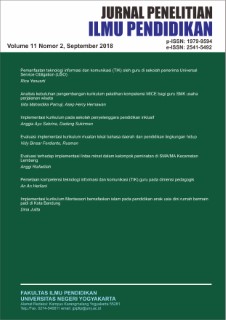Improving social skills and learning outcomes of fifth-grade students through contextual learning
DOI:
https://doi.org/10.21831/jpip.v17i1.87112Keywords:
Contextual learning, social skills, learning outcomes, elementary schoolAbstract
This study employs an action research method consisting of planning, implementation, observation, and reflection to enhance elementary students’ social skills and learning outcomes at Private Elementary School SYPPK Salib Suci Agats. The research follows a classroom action research model as outlined by Kemmis and McTaggart. Fifth-grade students (20 in total) at Private Elementary School YPPK Salib Suci Agats served as the subjects. Data was collected through both test and non-test techniques. Various assessment instruments, such as descriptive problem-solving tests, attitude rating scales, and learning implementation observation sheets, were used to gather data. The initial findings showed that only 5 out of 20 students (25%) achieved scores above the Minimum Mastery Criterion (MMC), indicating they met the required competency. After the first action cycle, the number of students scoring above the MMC increased to 11 students (55%), while 9 students (45%) remained below the MMC, necessitating a second cycle. Following reflections on the first cycle, certain shortcomings were identified (particularly the less-than-optimal use of learning media), which were addressed in the second cycle by incorporating concrete learning media. As a result, by the end of the second cycle, 17 students (85%) scored above the MMC. This improvement demonstrates the effectiveness of contextual learning in raising both the social skills and academic performance of the students.
References
Brown, J. S., Collins, A., & Duguid, P. (1989). Situated Cognition and the Culture of Learning. Educational Researcher, 18(1), 32–42. https://doi.org/10.3102/0013189X018001032
Darmuki, A. A. N. J., & Saddhono, K. (2018). The development and evaluation of speaking learning model by cooperative approach. International Journal of Instruction, 11(2).
Durlak, J. A., Weissberg, R. P., Dymnicki, A. B., Taylor, R. D., & Schellinger, K. B. (2011). The Impact of Enhancing Students' Social and Emotional Learning: A Meta-Analysis of School-Based Universal Interventions. Child Development, 82(1), 405–432. https://doi.org/10.1111/j.1467-8624.2010.01564.x
Elliott, S. N., & Gresham, F. M. (1993). Social Skills Interventions for Children. Behavior Modification, 17(3), 287–313. https://doi.org/10.1177/01454455930173004
Gaspar, T., Cerqueira, A., Branquinho, C., & Matos, M. G. (2018). The effect of a social-emotional school-based intervention upon social and personal skills in children and adolescents. Journal of Education and Learning, 7(6), 57–66.
Jones, D. E., Greenberg, M., & Crowley, M. (2015). Early Social-Emotional Functioning and Public Health: The Relationship Between Kindergarten Social Competence and Future Wellness. American Journal of Public Health, 105(11), 2283–2290. https://doi.org/10.2105/AJPH.2015.302630
Kemmis, S., & McTaggart, R. (1988). The Action Research Planner (3 ed.). Deakin University Press.
Kunandar. (2007). Guru Profesional Implementasi Kurikulum Tingkat Satuan Pendidikan (KTSP) dan Persiapan Menghadapi Sertifikasi Guru. PT. Raja Grafindo Persada.
Mahmuti, A., Hamzic, D. K., & Thaqi, X. (2025). The Impact of Contextual Teaching and Learning on Improving Student Achievement in Economic Mathematics. International Electronic Journal of Mathematics Education, 20(3), 1–14. https://doi.org/10.29333/iejme/16233
Pangemanan, A. (2020). Application of Contextual Teaching and Learning Approach on Statistics Material against Student Results. International Education Studies, 13(4), 1–7.
Pohan, A. E. (2020). Konsep pembelajaran dalam jaringan berbasis pendekatan ilmiah (scientific approach). CV. Sarnu Untung.
Seknun, M. Y. (2012). Kedudukan Guru Sebagai Pendidik. Lentera Pendidikan: Jurnal Ilmu Tarbiyah Dan Keguruan, 15(1), 120–131. https://doi.org/10.24252/lp.2012v15n1a10
Seprie, S., Wuryandani, W., & Muthmainah. (2025). Transforming primary education: balancing social skills and academic achievement through global inquiry-based learning models [Original Research]. Frontiers in Education, 10. https://doi.org/10.3389/feduc.2025.1512274
Simeru, A., Nasution, T., Takdir, M., Siswati, S., Susanti, W., & Karsiwan, W. e. a. (2023). Model-model Pembelajaran. Lakeisha.
Vh, H., & Ashok, J. (2024). Early Interventions and Their Impact on Social Skills and Academic Performance in Children with Specific Learning Disabilities. Frontiers in Health Informatics, 13(3).
Downloads
Published
How to Cite
Issue
Section
Citation Check
License
Copyright (c) 2024 Lenny Hanoatubun, Setiawan Edi Wibowo, Octavian Muning Sayekti

This work is licensed under a Creative Commons Attribution-ShareAlike 4.0 International License.









